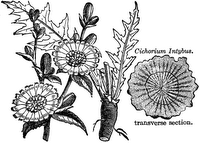 Today, April 27th …
Today, April 27th …Anne Frank, the German-born Jewish girl who spent two years in hiding in Amserdam during World War II, sometimes wrote in her diary about the food in “the Secret Annexe”. Food was smuggled to them by loyal Dutch employees of her father, who were struggling to feed themselves and risked their lives by hiding and feeding their Jewish friends. The figures will never be certain, but of about 25,000 Jews who hid in Holland during the war, two thirds survived.
On this day in 1943, in the ninth month of their stay, Anne wrote:
… Our food is miserable, Dry bread and coffee substitute for breakfast. Dinner: spinach or lettuce for a fortnight on end. Potatoes twenty centimetres long and tasting sweet and rotten. Whoever wants to follow a slimming diet should stay in the ‘Secret Annexe’.
Twelve months later she commented again on this pattern of “food cycles”, when for days or weeks on end they had nothing but one particular food, often half-rotten, “according to the season”, but in spite of the miserable food she still felt herself to be privileged to be with her family, to have a place to hide and to have good Dutch friends.
We dont know exactly what the coffee substitute was that Anne drank, but it was probably the dried and roasted root of chicory (Cichorium intybus), the same plant whose leaves we call “Belgian endive” and use in salads. Holland had been a centre of production of chicory since the eighteenth century, and chicory was certainly exported from there to America in the late eighteenth century specifically as a coffee extender and substitute.
Meanwhile, the folk in England thought they had it tough. It is difficult to even guess how the following English wartime recipe got its name. What or where is the connection with the Netherlands? Any ideas?
Dutch Flummery.
½ pint lemon squash; ¾ pint water; ½ oz powdered gelatine; 2 reconstituted dried eggs or fresh eggs; 2 oz sugar.
Put the squash and ½ pint of water into a saucepan and heat. Soften the gelatine with 2 tablespoons of water. Heat the remaining water and pour onto the gelatine. Add the eggs and sugar to the lemon mixture and cook slowly for 5 minutes. Remove the pan from the heat, add the dissolved gelatine, pour into a wet mould and allow to set.
Tomorrow: A ravishing cake.
On this Topic ...
Coffee substitutes were also featured in "Just like the Real Thing on April 19th.
Quotation for the Day ...
In most households a cup of coffee is considered the one thing needful at the breakfast hour. But how often this exhilarating beverage, that "comforteth the brain and heateth and helpeth digestion" is made muddy and ill-flavoured! ... You may roast the berries "to the queen's taste," and grind them fresh every morning, and yet, if the golden liquid be not prepared in the most immaculate of coffee-pots, with each return of morning, a new disappointment awaits you. Janet McKenzie Hill; Practical Cooking And Serving (1902)
3 comments:
excellent post! quite interesting about anne frank, and don't get me started on coffee...i can't live without the stuff!!!
Oh, my! I have just found Blog Gold in your wonderful web site.
Your blog is simply excellent. I will be a regular reader!
Now I am off to add you to my blog roll.
Thankyou juliebean and andrea for the lovely comments. There is a whole book to be written somewhere sometime on coffee substitues - but then there is a whole book to be written on a whole lot of things ....
Post a Comment